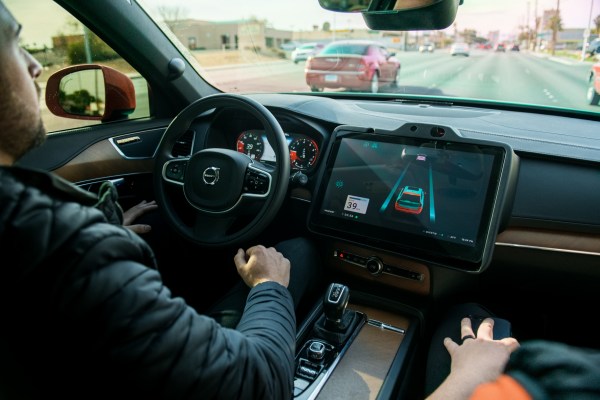
January 20, 2022.
Not a single advanced driver assistance system offered in today's new vehicles would meet pending safety criteria being developed by the Insurance Institute for Highway Safety, according to the organization.
The nonprofit that is funded by auto insurance companies said Thursday that its new rating program will evaluate the safeguards that vehicles with partial automation use to help drivers stay focused on the road.
IIHS will give systems ratings. The first set of ratings is expected to be issued in 2022, IIHS said, though it did not give a specific date because ongoing supply chain issues have made it more difficult to obtain vehicles for testing.
David Harkey, president of the IIHS, said in a statement that there is no evidence that partial automation systems make driving safer. If systems lack adequate safeguards, the opposite may be the case.
To earn a good rating, vehicles will have to have a driver monitoring system that ensures a driver's eyes are directed at the road and that their hands are ready to grab at all times, the organization said. If a driver ignores advanced driver assistance systems, they must be equipped with emergency procedures.
The new IIHS ratings won't address other functional aspects of the systems that could potentially contribute to crashes, such as how well their cameras or radar sensors identify obstacles.
There are an array of partial automation features in advanced driver assistance systems. A feature that combines adaptive cruise control, which maintains a driver-selected speed and automatically slows to maintain a selected following distance, with lane centering that continuously adjusts the steering to help the driver keep the vehicle in the middle of the travel lane is a common feature. IIHS noted that lane changing is becoming more common.
The move by the IIHS to rate automated driving systems follows a regulatory and consumer advocacy trend. Consumer Reports said it will start awarding points for partially automated driving systems. CR will factor in IIHS safeguard ratings once they are available.
Consumer Reports said that it will include evaluations of driver monitoring systems when it announces its Top Picks in February. CR will add two points to a vehicle's overall score if it features a system that encourages safe driving as part of the model's active driving assistance package.
Ford's BlueCruise and GM's Super Cruise systems will be the only ones to earn these additional points.
If the new vehicle lacks adequate driver monitoring, CR will dock two points from the overall score. The loss of four points will start with the 2026 models.
Most partial automation systems have some safeguards in place, but none of them meet all of the organization's pending criteria. Drivers can push the system well beyond its safe operation.
The way many of these systems operate gives people the impression that they are capable of doing more than they really are, according to IIHS research scientist Alex Muller, who is spearheading the new ratings program. Drivers can still wander even when they understand the limitations of partial automation. It is more difficult for us to remain vigilant when we are watching and waiting for a problem to occur than it is when we are doing all the driving ourselves.
There are no self-driving cars that consumers can buy, but that doesn't mean that automakers can't overstate the system's capabilities.
The branding of the Autopilot advanced driver assistance system that comes standard in its vehicles and the upgraded FSD software package that costs $12,000 has been criticized. The capabilities of their systems have been oversold.
You can copy.
CNBC broke the news that Peloton is stopping production of its hardware for a while. The first from May 2020 was compared and contrasted by our friends at...
In order to meet changing customer demands, companies need a mechanism that provides unbiased insights from people that represent them.
TikTok is testing support for paid subscriptions. The Information reported that the popular short-form video app is exploring an option.
Users will be able to show off their NFTs, or non-fungible token, when they use the new feature. The company is called roll...
Insight Partners led a $25 million Series A round for Prophecy, a low-code platform for data engineering. Existing investors SignalFire and Berkeley Skydeck...
483 of its users were affected by a recent hack on its platform, and unauthorized withdrawals of more than $1 million, according to a statement on its website today.
The International Space Station could be connected to a film studio and sports arena in December of 2024. A Tom Cruise movie is being co-produced by a company.
The time has come for artificial intelligence due to the maturing of the industry and more people knowing how to use it.
It would be a bigger surprise if it wasn't for the fact that it was being baked up by the company. The company is said to be targeting a 2024 ship date according to a new report.
The pieces of the puzzle begin to click into place when you understand that China is trying to win dominance across the technology sector.
A cool new method for producing synthetic speech isn't a way to recognize, but it's still an advancement in the realm of artificial intelligence.
Tech can combine multiple types of data we can't see, like lidar, IR, and so on. Metalenz is a maker of 2D cameras.
It has been a long time since we had a live, in-person event. Join us on April 14 for the TechCrunch Early Stage.
Mercedes-Benz plans to use lidar technology in future vehicles as part of a broader deal that includes data sharing and the automaker taking a small stake in the company.
A new app called Weavit wants to offer people a different way to quickly capture their thoughts in a note-taking tool.
Dr. Jeff Wessler and Kanyi Maqubela helped start the company by writing the pre-seed check. We are excited.